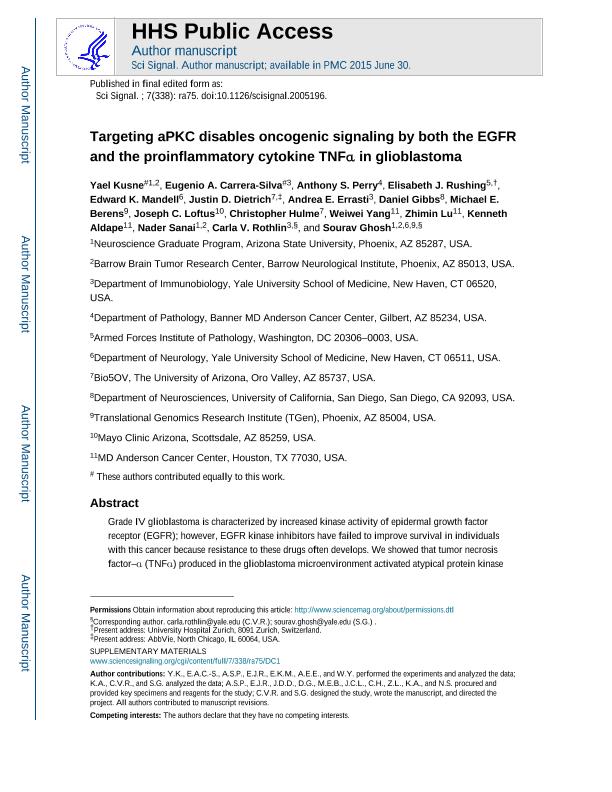Artículo
Targeting aPKC disables oncogenic signaling by both the EGFR and the proinflammatory cytokine TNFa in glioblastoma
Yael, Kusne; Carrera Silva, Eugenio Antonio ; Perry, Anthony S.; Rushing, Elisabeth J.; Mandell, Edward K.; Dietrich, Justin D.; Errasti, Andrea Emilse
; Perry, Anthony S.; Rushing, Elisabeth J.; Mandell, Edward K.; Dietrich, Justin D.; Errasti, Andrea Emilse ; Gibbs, Daniel; Berens, Michael E.; Loftus, Joseph C.; Hulme, Christopher; Yang, Weiwei; Lu, Zhimin; Aldape, Kenneth; Sanai, Nader; Rothlin, Carla V.; Ghosh, Sourav
; Gibbs, Daniel; Berens, Michael E.; Loftus, Joseph C.; Hulme, Christopher; Yang, Weiwei; Lu, Zhimin; Aldape, Kenneth; Sanai, Nader; Rothlin, Carla V.; Ghosh, Sourav
 ; Perry, Anthony S.; Rushing, Elisabeth J.; Mandell, Edward K.; Dietrich, Justin D.; Errasti, Andrea Emilse
; Perry, Anthony S.; Rushing, Elisabeth J.; Mandell, Edward K.; Dietrich, Justin D.; Errasti, Andrea Emilse ; Gibbs, Daniel; Berens, Michael E.; Loftus, Joseph C.; Hulme, Christopher; Yang, Weiwei; Lu, Zhimin; Aldape, Kenneth; Sanai, Nader; Rothlin, Carla V.; Ghosh, Sourav
; Gibbs, Daniel; Berens, Michael E.; Loftus, Joseph C.; Hulme, Christopher; Yang, Weiwei; Lu, Zhimin; Aldape, Kenneth; Sanai, Nader; Rothlin, Carla V.; Ghosh, Sourav
Fecha de publicación:
08/2014
Editorial:
American Association for the Advancement of Science
Revista:
Science Signaling
ISSN:
1937-9145
Idioma:
Inglés
Tipo de recurso:
Artículo publicado
Clasificación temática:
Resumen
Grade IV glioblastoma is characterized by increased kinase activity of epidermal growth factor receptor (EGFR); however, EGFR kinase inhibitors have failed to improve survival in individuals with this cancer because resistance to these drugs often develops. We showed that tumor necrosis factor-alpha (TNFa) produced in the glioblastoma microenvironment activated atypical protein kinase C (aPKC), thereby producing resistance to EGFR kinase inhibitors. Additionally, we identified that aPKC was required both for paracrine TNFa-dependent activation of the transcription factor nuclear factor kappa B (NF-kB) and for tumor cell-intrinsic receptor tyrosine kinase signaling. Targeting aPKC decreased tumor growth in mouse models of glioblastoma, including models of EGFR kinase inhibitor-resistant glioblastoma. Furthermore, aPKC abundance and activity were increased in human glioblastoma tumor cells, and high aPKC abundance correlated with poor prognosis. Thus, targeting aPKC might provide an improved molecular approach for glioblastoma therapy.
Palabras clave:
aPKC
,
EGFR
,
TNFα
,
glioblastoma
Archivos asociados
Licencia
Identificadores
Colecciones
Articulos(OCA HOUSSAY)
Articulos de OFICINA DE COORDINACION ADMINISTRATIVA HOUSSAY
Articulos de OFICINA DE COORDINACION ADMINISTRATIVA HOUSSAY
Citación
Yael, Kusne; Carrera Silva, Eugenio Antonio; Perry, Anthony S.; Rushing, Elisabeth J.; Mandell, Edward K.; et al.; Targeting aPKC disables oncogenic signaling by both the EGFR and the proinflammatory cytokine TNFa in glioblastoma; American Association for the Advancement of Science; Science Signaling; 7; 338; 8-2014; ra75-ra75
Compartir
Altmétricas



